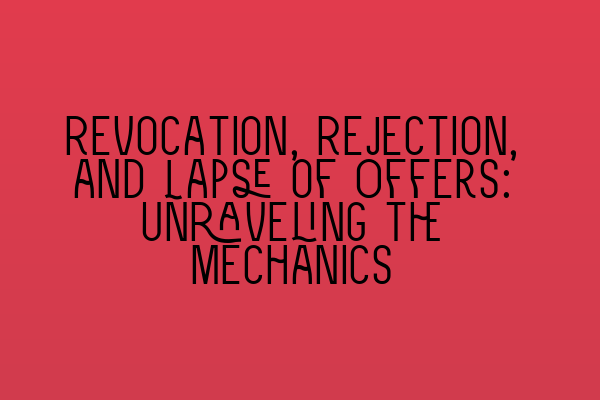Revocation, Rejection, and Lapse of Offers: Unraveling the Mechanics
As a solicitor specializing in contract law, it is essential to have a thorough understanding of the mechanics of offers, including their revocation, rejection, and lapse. These concepts play a critical role in determining the enforceability and validity of contractual agreements. In this article, we will unravel the intricacies of these concepts to provide you with a comprehensive understanding.
Let’s begin by examining the revocation of offers. Revocation refers to the withdrawal or cancellation of an offer by the offeror before it is accepted by the offeree. The general rule is that an offer can be revoked at any time before acceptance, except in specific circumstances.
One such circumstance where an offer cannot be revoked is when the offeror has made a promise to keep the offer open for a specified period, known as an option. During this period, the offeror is bound to keep the offer open, and any attempt to revoke the offer would be considered a breach of contract.
Another exception to the general rule of revocation is the concept of a unilateral contract. In a unilateral contract, the offeror promises something in exchange for a specific act by the offeree. Once the offeree begins the requested action, the offer becomes irrevocable, and the offeror is obligated to fulfill their promise upon completion of the act.
It is important to note that revocation of an offer must be communicated to the offeree before acceptance. In other words, if the offeree learns of the revocation through a third party or by any means other than direct communication from the offeror, the offer is still considered valid until the offeree receives notice of the revocation.
Now, let’s move on to the rejection of offers. Rejection occurs when the offeree expressly refuses to accept the offer. It is important to understand that a rejection terminates the offer, and the offeror is no longer bound by it. The rejection can be communicated through any reasonable means, including oral or written communication.
However, it is crucial to be aware of the concept of counteroffers. A counteroffer is a response from the offeree that introduces new terms or conditions to the original offer. When a counteroffer is made, the original offer is considered rejected and terminated. The roles are essentially reversed, with the original offeror becoming the offeree and having the option to accept or reject the counteroffer.
Finally, let’s explore the concept of the lapse of offers. An offer can lapse or expire in several ways. First, an offer can lapse by the expiration of the time period specified in the offer itself. For example, if an offer states that it will remain open for 30 days, and the offeree fails to accept within that timeframe, the offer lapses, and the offeree can no longer accept it.
Second, an offer can lapse by the occurrence of a condition stated in the offer. If the condition is not fulfilled within the specified timeframe, the offer automatically lapses. It is crucial for both parties to clearly understand and communicate any conditions attached to an offer to avoid confusion and ensure the validity of the offer.
Furthermore, an offer can also lapse due to the death or insanity of either the offeror or the offeree. In such circumstances, the offer becomes automatically invalid, as the parties involved are no longer capable of entering into a legally binding agreement.
In conclusion, revocation, rejection, and lapse are essential concepts in contract law that determine the enforceability and validity of offers. As a solicitor, it is crucial to grasp the mechanics of these concepts to provide sound legal advice to clients and ensure the smooth execution of contractual agreements.
If you found this article informative and would like to further enhance your knowledge of contract law and prepare for the SQE exams, we recommend checking out the following related articles:
– [SQE 1 Practice Exam Questions](https://fqps.co.uk/sqe/sqe1-preparation/mcq-practice-quiz): Sharpen your knowledge with practice questions to excel in the SQE 1 exams.
– [SQE 1 Practice Mocks FLK1 FLK2](https://fqps.co.uk/sqe/sqe1-preparation/practice-mocks-quiz): Get hands-on experience with mock exams designed to simulate the SQE 1 exam environment.
– [SQE 2 Preparation Courses](https://fqps.co.uk/sqe/sqe2-preparation): Explore comprehensive courses tailored to help you prepare for the SQE 2 exams.
– [SQE 1 Preparation Courses](https://fqps.co.uk/sqe/sqe1-preparation): Enhance your understanding of the SQE 1 syllabus with expert-led preparation courses.
– [SRA SQE Exam Dates](https://fqps.co.uk/sqe/sqe1-sqe2-exam-dates): Stay updated on the latest exam dates and deadlines for the SRA SQE exams.
By consistently expanding your knowledge and staying updated on the latest developments in contract law, you will be well-equipped to navigate the intricacies of revocation, rejection, and lapse, ensuring the best outcomes for your clients.
